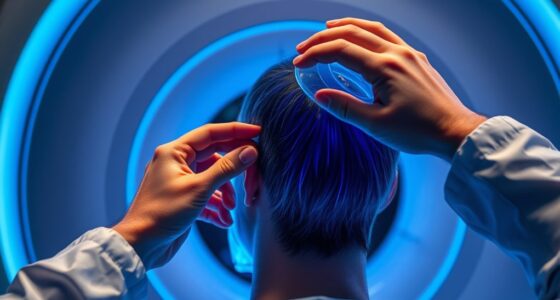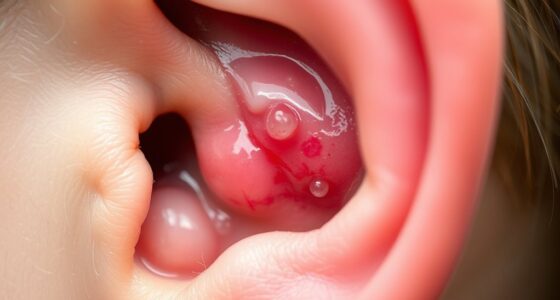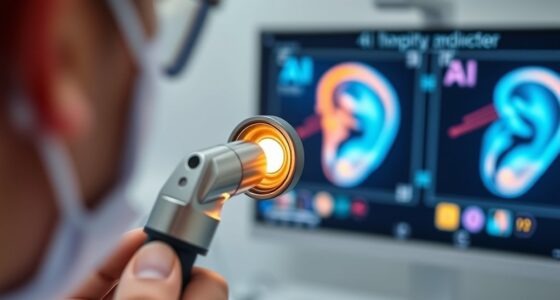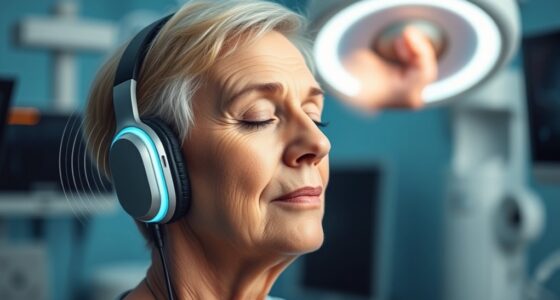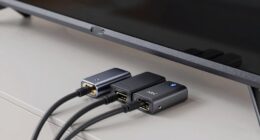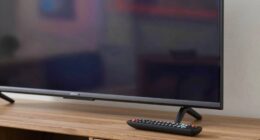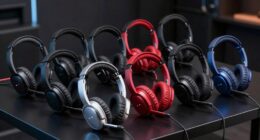To tackle age-related hearing loss, focus on early detection through advanced screening and diagnostic tools, including genetic testing, which can reveal individual risks. Embrace innovative treatments like hearing aids and cochlear implants, and stay proactive with lifestyle choices such as protecting your ears from noise and maintaining overall health. Support systems and rehabilitation strategies also help improve communication and quality of life. Explore further to discover how ongoing research and new technologies continue to improve care options.
Key Takeaways
- Advances in genetic testing and diagnostics enable early detection and personalized intervention for age-related hearing loss.
- Emerging technologies like nanotechnology and gene therapy hold promise for innovative, less invasive treatment options.
- Improved hearing devices, including smart hearing aids and cochlear implants, enhance sound quality and user experience.
- Lifestyle modifications, such as noise protection and ear health maintenance, help prevent or delay hearing deterioration.
- Community support, caregiver training, and awareness programs promote better management and reduce stigma associated with presbycusis.
Understanding the Causes of Age-Related Hearing Loss
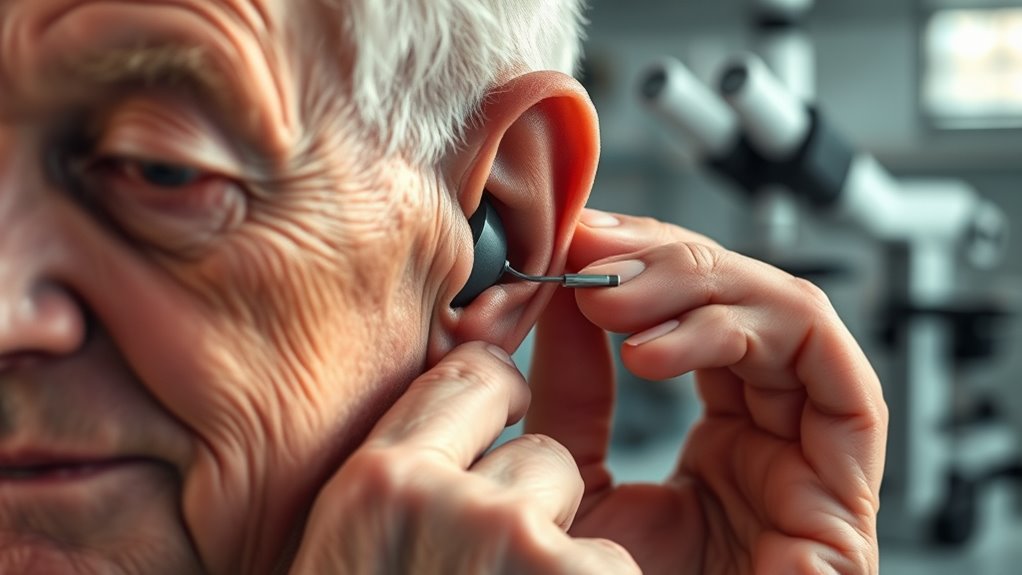
As you age, your hearing may decline due to a combination of factors that affect the inner ear and auditory pathways. One primary cause is sensorineural decline, which involves damage to the delicate structures responsible for converting sound into neural signals. Cochlear degeneration is a common contributor, where the tiny hair cells in your cochlea deteriorate over time. This degeneration reduces your ability to detect high-frequency sounds and process speech clearly. Age-related changes also affect the auditory nerve, making it harder to transmit signals efficiently. These biological alterations gradually diminish your hearing capacity, especially in noisy environments. Research on age-related hearing loss highlights the importance of understanding these underlying biological changes to develop effective care strategies. Additionally, ongoing studies emphasize the potential role of ear health maintenance in slowing or mitigating hearing decline, underscoring the significance of preserving cochlear function for better auditory health as you age. Maintaining overall systemic health can also support auditory health and potentially delay hearing deterioration over time. Furthermore, preventive measures such as regular hearing check-ups and avoiding loud noises are crucial in protecting your hearing health throughout aging.
Advances in Early Detection and Diagnostic Techniques
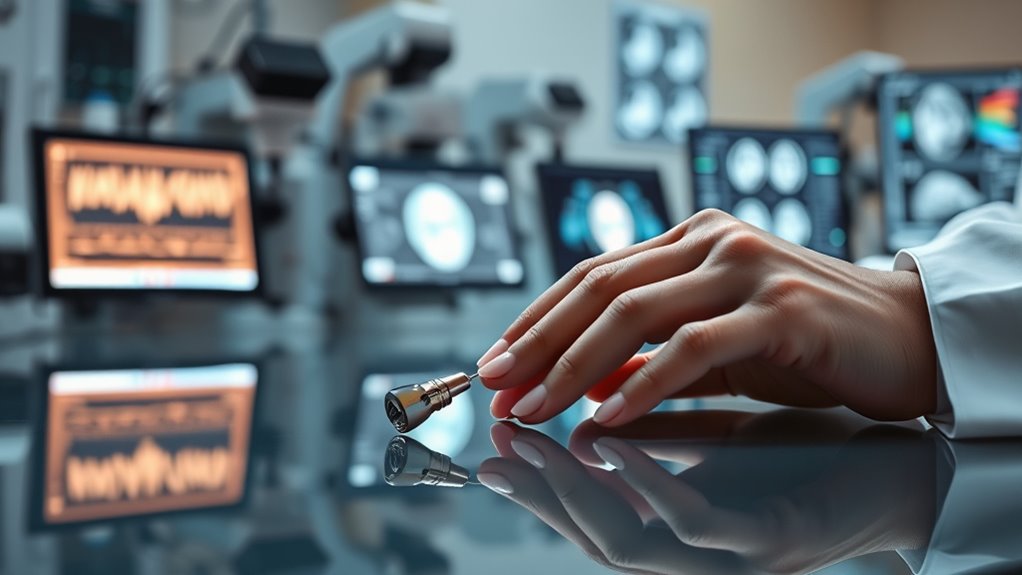
Recent advances in diagnostic techniques enable earlier and more accurate detection of age-related hearing loss. Improved screening protocols now allow you to identify hearing issues quickly, often before noticeable symptoms emerge. These protocols include thorough audiometric tests that assess hearing thresholds across different frequencies. Additionally, diagnostic imaging technologies, such as MRI and CT scans, provide detailed views of the inner ear structures, helping pinpoint underlying causes of hearing decline. These innovations help clinicians differentiate age-related loss from other conditions and tailor interventions more effectively. Early detection through these refined techniques ensures you receive timely advice and treatment, ultimately preserving your hearing health and quality of life. Staying informed about these advancements empowers you to seek assessments sooner and take proactive steps. Speaks 4 Me Online offers guidance on how to effectively communicate your needs with healthcare providers. Incorporating advanced diagnostic tools into routine evaluations further enhances early detection capabilities, leading to better management outcomes.
Innovative Treatment Options and Hearing Devices
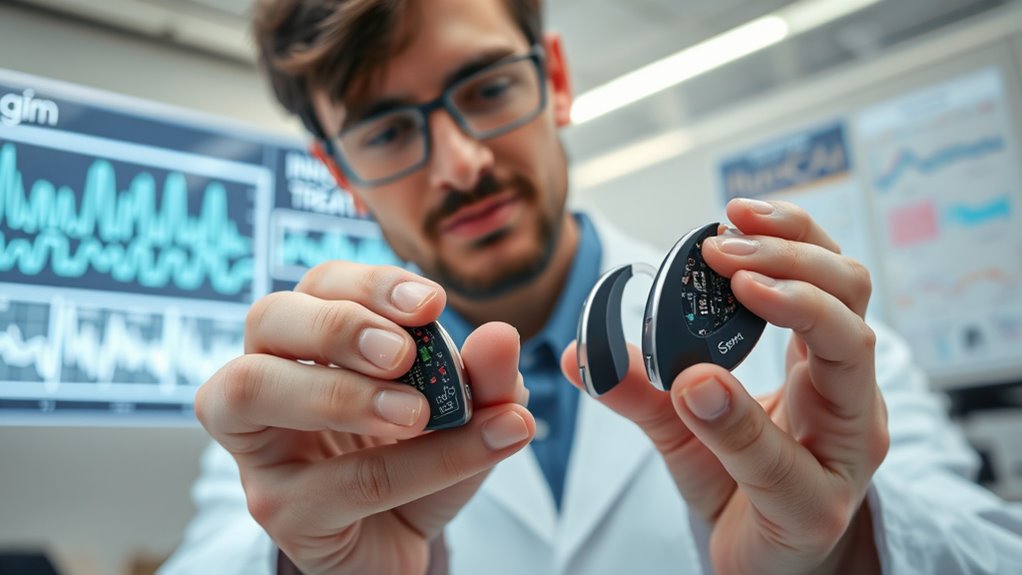
Advancements in hearing technology have revolutionized how age-related hearing loss is treated, offering more effective and personalized options. Cochlear implants now provide a solution for individuals with severe to profound hearing loss, directly stimulating the auditory nerve for clearer sound perception. Additionally, hearing aid innovations have transformed devices into highly adaptable tools, with features like automatic noise reduction, Bluetooth connectivity, and customizable settings. These improvements ensure you get a more natural listening experience and better speech understanding in various environments. Modern hearing devices are discreet, comfortable, and tailored to your specific needs, making it easier to stay connected and engaged. Technological innovations in hearing devices also facilitate better integration with smartphones and other digital platforms, enhancing user convenience. As technology continues to evolve, these innovative options considerably enhance your quality of life by restoring auditory function more effectively than ever before. Toilet flushing mechanisms and other household plumbing systems have also benefited from technological advances, emphasizing water efficiency and user convenience. Moreover, personalized hearing care strategies, including regular assessments and adjustments, are essential to ensure optimal device performance and user satisfaction. Embracing these adaptive technologies can significantly improve daily communication and overall well-being for those experiencing hearing loss.
The Role of Genetics in Presbycusis
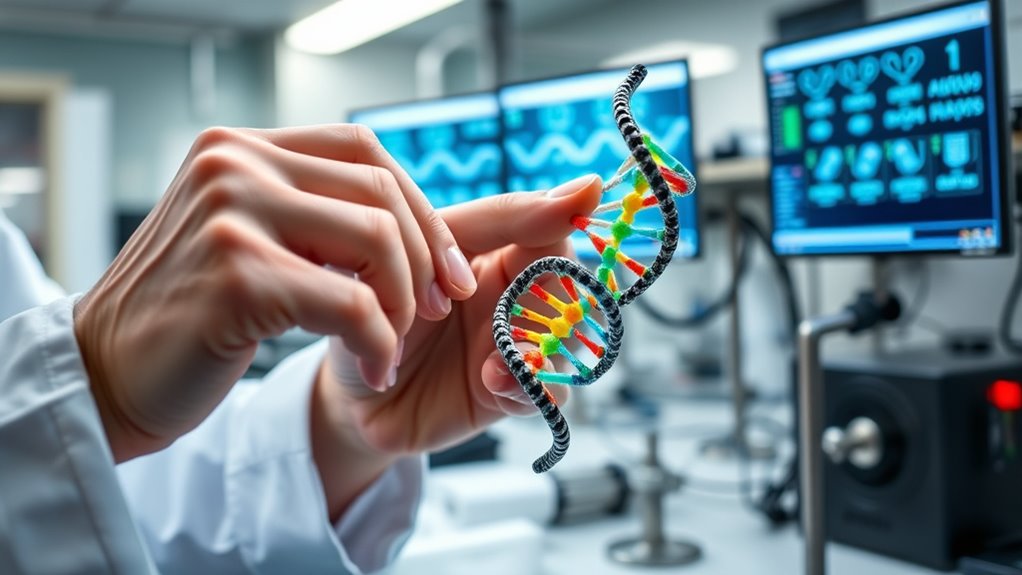
Your genetics can influence your risk of developing presbycusis, with specific genetic markers linked to hearing loss. Understanding inheritance patterns helps explain why some people experience earlier or more severe deterioration. Recognizing these genetic factors can inform personalized prevention and treatment strategies. Advances in sound design technology also contribute to the development of innovative hearing aids and assistive devices tailored to genetic profiles. Additionally, ongoing research into genetic markers continues to enhance our understanding of hereditary hearing loss, emphasizing the importance of personalized medicine in managing age-related auditory decline. The integration of genetic testing into routine assessments further supports targeted approaches for those at higher risk.
Genetic Markers and Hearing Loss
Genetic factors play a significant role in age-related hearing loss, also known as presbycusis, by influencing how your auditory system ages over time. Researchers identify specific genetic markers linked to increased risk, helping to predict susceptibility. Genetic testing can reveal these markers, allowing for early intervention strategies. In the future, gene therapy might offer targeted treatments to modify or repair defective genes responsible for hearing decline. Here’s a quick look at some genetic influences: Genetic predisposition
| Genetic Marker | Impact on Hearing Loss |
|---|---|
| GJB2 | Affects cochlear cell function |
| SLC26A4 | Linked to auditory nerve health |
| MYO7A | Impairs hair cell regeneration |
| TMPRSS3 | Contributes to auditory degradation |
Understanding these markers paves the way for personalized care and innovative therapies. Additionally, ongoing research into genetic susceptibility is expanding our understanding of how these factors interact with environmental influences to impact hearing health over time. A growing body of evidence suggests that genetic mutations may also influence the effectiveness of future treatments.
Inheritance Patterns in Presbycusis
Genetics play a fundamental role in determining how presbycusis runs in families, influencing the inheritance patterns of age-related hearing loss. You might notice hearing difficulties running in your family, suggesting a genetic component. Understanding these inheritance patterns helps you and your healthcare provider assess your risk more accurately. Genetic counseling can provide valuable insights into your family’s history and guide you through possible genetic factors involved. While presbycusis often results from a combination of genetic and environmental influences, specific inheritance patterns, such as autosomal dominant or recessive traits, can affect your likelihood of developing hearing loss. Recognizing these patterns allows for earlier intervention and tailored hearing care strategies, improving your quality of life as you age. Additionally, ongoing research into the inheritance patterns of presbycusis continues to shed light on the complex interplay between genetics and environmental factors. Advances in genetic testing are improving our understanding of hereditary hearing loss and enabling more personalized treatment options. Moreover, understanding family history can help identify those at higher risk and promote proactive management strategies. Exploring genetic factors involved in presbycusis may also lead to future preventive therapies and targeted interventions, especially as the field of genetics advances rapidly.
Rehabilitation and Support Strategies for Better Communication

To improve communication for those with age-related hearing loss, implementing effective rehabilitation and support strategies is essential. Using assistive devices like hearing aids and amplifiers can make sounds clearer and conversations easier. Additionally, adopting communication strategies such as facing the speaker, reducing background noise, and speaking slowly helps you understand better. Incorporating hearing protection to prevent further hearing deterioration is also beneficial. Understanding digital payment solutions can be advantageous in managing healthcare costs associated with hearing loss treatments. Regular use of HEPA filtration can also help improve overall indoor air quality, which may support better ear health and reduce irritants that could worsen hearing issues.
Emerging Technologies and Future Research Directions

Emerging technologies are rapidly transforming how we address age-related hearing loss, offering promising solutions for better diagnosis, treatment, and management. Augmented reality devices are being developed to enhance auditory training and improve communication in real-world environments. These tools provide immersive experiences that help users adapt more effectively. Additionally, nanotechnology-based therapies are opening new frontiers in precision medicine. Researchers are exploring nanoparticles that can target and repair damaged inner ear cells at a cellular level, potentially restoring hearing function. These innovations promise less invasive, more personalized approaches to hearing care. While some technologies are still in experimental stages, ongoing research continues to push boundaries, bringing us closer to more effective, accessible solutions for age-related hearing loss in the future.
Lifestyle Factors That Influence Hearing Health

Have you ever wondered how your daily habits can affect your hearing health? Your dietary habits play a role, as a balanced diet rich in vitamins like A, C, and E can support ear health and reduce damage from free radicals. Conversely, poor nutrition may accelerate age-related decline. Noise exposure is another critical factor; frequent loud environments can damage delicate hair cells in your inner ear, leading to hearing loss over time. Protecting your ears with earplugs or limiting exposure to loud sounds can make a significant difference. Additionally, maintaining a healthy weight, avoiding smoking, and managing cardiovascular health all contribute to better hearing. Small changes in your lifestyle can help preserve your hearing ability as you age.
Building Support Systems for Aging Individuals With Hearing Loss
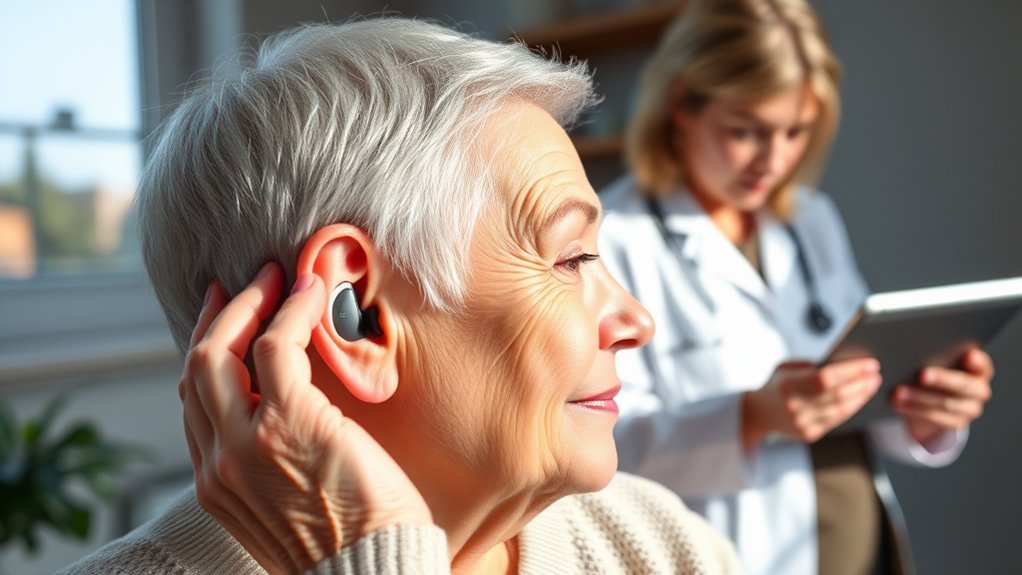
How can you effectively build support systems for aging individuals with hearing loss? You can foster community engagement and strengthen caregiver support networks. These efforts create a supportive environment where seniors feel understood and connected. Encourage local programs like hearing aid workshops or social groups, which promote interaction. Additionally, providing caregivers with resources and training enhances their ability to assist effectively. Consider this table to identify key support strategies:
| Strategy | Implementation Example | Expected Outcome |
|---|---|---|
| Community Engagement | Organize hearing health awareness events | Increased awareness, reduced stigma |
| Caregiver Support | Offer training sessions for family members | Improved caregiving skills |
| Peer Support Networks | Establish local support groups | Emotional comfort, shared experiences |
This approach guarantees aging individuals receive thorough, empathetic care.
Frequently Asked Questions
How Can I Prevent Age-Related Hearing Loss Before Symptoms Appear?
To prevent age-related hearing loss before symptoms appear, prioritize early screening to catch issues early. Make lifestyle modifications like avoiding loud noises, using ear protection, and maintaining overall health through proper diet and exercise. Regular check-ups with an audiologist can help detect potential problems early. By staying proactive, you can protect your hearing and potentially delay or prevent significant hearing decline as you age.
Are There Non-Invasive Ways to Assess Hearing Loss Severity Accurately?
Did you know over 30 million Americans experience hearing loss, yet many go undiagnosed? Non-invasive assessments like acoustic testing and identifying auditory biomarkers allow you to evaluate your hearing health accurately without discomfort. These methods detect early changes in auditory function, helping you understand your hearing loss severity. With advancements in technology, you can access these assessments conveniently, making early detection easier and more reliable than ever before.
What Are the Latest Breakthroughs in Hearing Aid Technology?
You’ll find that the latest breakthroughs in hearing aid technology include advanced algorithms that adapt in real-time, offering clearer sound and better noise reduction. Additionally, cochlear implants have become more sophisticated, providing improved speech understanding for severe hearing loss. These innovations enhance your experience by making sounds more natural and personalized, ensuring you stay connected and engaged with your environment.
Can Dietary Changes Impact Hearing Health in Older Adults?
You might think dietary changes won’t affect your hearing, but research shows nutritional interventions and dietary supplementation can support ear health. Eating a balanced diet rich in vitamins A, C, E, and minerals like zinc may help protect your hearing as you age. By making simple dietary modifications, you actively promote better hearing health, reducing the risk of further decline and enhancing your overall well-being.
How Do Social and Emotional Factors Affect Hearing Loss Management?
You might find that social and emotional factors considerably influence your hearing loss management. When your emotional well-being is strong, you’re more likely to stay engaged socially, which can motivate you to seek treatment and use hearing aids effectively. Conversely, feelings of isolation or frustration can make coping harder. Staying socially active boosts your confidence and helps you adapt better, ultimately improving your overall hearing health and quality of life.
Conclusion
As you explore these strategies, remember that early detection and proactive care can make a real difference. Imagine an elderly person, Sarah, who notices her hearing diminishing but seeks help early. With the right treatment and support, she stays connected with her family and community. By staying informed and engaged, you can take control of your hearing health, ensuring a more vibrant and connected life as you age.




